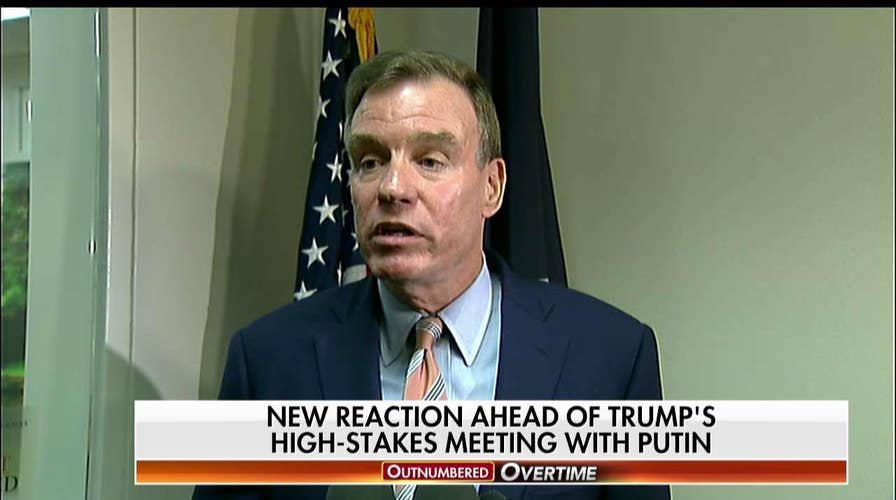Dems Demand Putin Summit Be Called Off Unless Indictment Discussed
Dems Demand Putin Summit Be Called Off Unless Indictment Mentioned
Calls by some Democrats in Congress for President Trump to cancel his Monday summit with Russian President Vladimir Putin – in response to the indictment Friday of 12 Russian intelligence officers accused of hacking emails of the Democratic Party and Hillary Clinton – make no sense. President Trump is wise to stick with his plans to meet with the Russian leader in Finland.
White House press secretary Sarah Sanders confirmed Friday night that the summit will take place despite the indictments.
President Trump agreed to the meeting with Putin not as a reward or endorsement for Russian interference in our 2016 presidential election, but because the meeting is in America’s national interest. Like it or not, Russia is a major nuclear power and the U.S. needs to maintain a relationship that will minimize conflicts between our two countries and advance U.S. foreign policy goals around the world.
Similarly, when President Nixon began the process of normalization of relations with China that led to diplomatic recognition and trade with the communist nation he was under no illusions that China was a peace-loving democracy that posed no threat to U.S. interests. But President Nixon – like other presidents throughout our history – concluded that America must deal with nations with which we have adversarial relationships.
Does anyone seriously think that that President Franklin Roosevelt believed Soviet dictator Josef Stalin was a true friend bearing no ill will toward the U.S. when Roosevelt and Stalin formed an alliance to fight the Nazis in World War II? No one is talking now about Trump and Putin forming a military alliance – the two leaders just want to discuss issues of importance to both of our countries.
The grand jury indictments Friday grew out of the investigation by Special Counsel Robert Muller of Russian election meddling and allegations that some people in the Trump campaign may have colluded with the Russians.
Deputy White House Press Secretary Lindsay Walters said that the indictment did not make any allegations that the Trump campaign worked with the Russians to interfere with the U.S. election or that Russian interference influenced the 2016 U.S. presidential election.
The 11-count indictment of the 12 Russians includes charges of conspiracy against the U.S., money laundering and attempts to hack into the computers of government agencies including state election boards.
President Trump said earlier in the day Friday in England that he would again bring up the issue of Russian interference in the American election when he meets with Putin Monday, but said he expects Putin will stick with Russia’s position denying such interference ever took place. Our president is right – it’s unrealistic to expect he can force Putin to admit something Putin has long denied.
It’s about time the two leaders met one-on-one. President Trump has sat down with Chinese president Xi Jinping twice for lengthy meetings, once in Florida and once in Beijing. And Trump just concluded a meeting with leaders of the other 28 NATO nations in Belgium and with British Prime Minister Theresa May in England.
In fact, Trump has met with many leaders from around the world, both friendly and unfriendly since taking office, including North Korean dictator Kim Jong Un in June.
The Russian Foreign Ministry issued a statement Friday saying there is no evidence that the 12 people indicted by Mueller are linked to Russian military intelligence and calling the indictments a “shameful farce” designed to “spoil the atmosphere before the Russian-American summit.”
The Russians earlier blamed the U.S. political climate for holding up a summit, and they are right about that. Reporters and Democrats have whipped themselves into a frenzy with the false claim that the Trump campaign colluded with Russia to swing the presidential election, and are ready to pounce on President Trump for even the hint of a “tilt” toward Putin.
Presidents Putin and Trump certainly have plenty of issues to discuss on Monday besides Russia’s meddling in our 2016 election, even though that’s unquestionably an important and serious issue.
Let’s just look at one of these important issues – the Syrian civil war, where both the Russians and Iranians have troops propping up the brutal regime of dictator Bashar Assad.
Russia sent forces to fight in Syria in September 2015. Since then, Russia has become an increasingly dominant player in Middle East politics.
Today Russia – following in the footsteps of the Soviet Union – once again has military bases in Syria, including a naval base on the Mediterranean. With the deployment of Russian-controlled S-300 and S-400 advanced air defense batteries, Russia dominates Syria’s air space. That’s why Israeli Prime Minister Benjamin Netanyahu travels frequently to Moscow to discuss Syria with Putin, as he did again on Wednesday.
Israel’s main concern is the presence of Iranian troops and proxies in Syria – some sources say as many as 70,000 armed men. The Iranians have acknowledged losing 2,100 of their own soldiers in Syria and Iraq over the past seven years, in addition to 2,000 Afghans and another 1,200 Lebanese Hezbollah fighters, all fighting under Iranian command.
The high death toll is indicative of the leading role Iran and its proxies have been playing in keeping Assad in power. Without the Iranians as foot soldiers, Assad would have been defeated long ago.
Why is Iran so intent on helping Assad? Because doing so serves Iran’s strategic objective of opening a direct military front with the state of Israel – a nation Iranian leaders have vowed to destroy.
Iran had been boasting of establishing a land bridge giving its troops direct access to the Israeli border for some time. When those boasts became reality, Israel took action and has bombed Iranian positions inside Syria on multiple occasions.
Before each bombing mission, Netanyahu either traveled to Moscow to inform Putin personally of the impending strike, or sent a senior official. Not once did the Russians activate their advanced air defense systems. If Netanyahu had refused to meet with Putin – as President Trump’s critics demand of him – a military conflict between Israel and Russia may have erupted.
U.S. allies Saudi Arabia and the United Arab Emirates are also worried about Iran’s military presence in Syria, and reportedly have been lobbying the Trump administration to negotiate a “grand bargain” with Russia that could be announced at the Trump-Putin summit: Russia gets Iran to withdraw from Syria, in exchange for the U.S. lifting Ukraine-related sanctions on Russia.
While that’s a deal that President Trump might like to take, it’s doubtful he could get away with it politically, given the current anti-Russia hysteria in Washington.
Nor is it obvious that Russia has the power, let alone the will, to get Iran to leave Syria. But Russia does have influence over Iran, and could get the Iranians to withdraw their forces beyond the 50-mile buffer zone from the Golan Heights, as Israel has been demanding.
What can Trump offer in exchange? Very little, at this point. But he can draw a roadmap for Putin that ends with the lifting of U.S. and international sanctions against Russia if Russia reigns in Iran’s aggressive behavior around the Middle East and if Putin reigns in his own aggression in Ukraine.
Putin has stated he would like to have better relations with the U.S. But to get there, President Trump should demand that Russia use its influence to curb Iranian aggression in Yemen, that it not undermine U.S. sanctions on Iran once they go back into effect in August, and that Russia instruct its banks to stop providing a lifeline to Iran’s corrupt leaders.
President Trump should stress with Putin that the U.S. intends to put the evil and dangerous Iranian regime out of business, and will punish companies and countries that continue to do business with Iran.
Putin may be under the illusion that his close ties to Tehran benefit Russia. It’s President Trump’s job to make him realize they are a liability.
There is not space here to discuss the many other important issues that President Trump can bring up at his summit with Putin. It’s impossible to know now if the meeting between the two leaders will produce any breakthroughs on any of these issues – but we know that no agreements will be reached if the summit is canceled.
The late Israeli Defense Minister Moshe Dayan said: “If you want to make peace, you don’t talk to your friends. You talk to your enemies.” That’s sound advice for critics of the upcoming Trump-Putin summit to keep in mind and explains why the summit can benefit our nation.









































